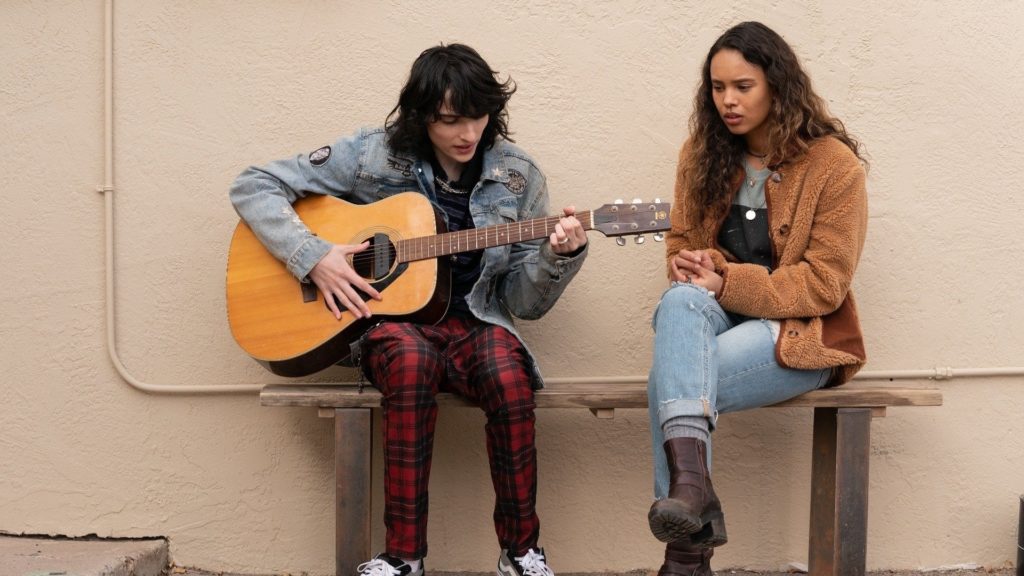Let's get political
I didn’t think it was possible for a movie in 2023 to contain an original insight about teens. But When You Finish Saving the World is genuinely thought-provoking. It argues from a unique lens that the increasing alienation some of us feel is not a byproduct of technology or phones or social media, nor even of late stage capitalistic dystopia, but the deterioration of local and family communities right on our doorstep — especially as we (somewhat ironically) obsess over global connections. Jesse Eisenberg, adapting his novel of the same name, presents a unique cast of characters struggling with these very contradictions — connecting more to the broader world even as we’re lonelier than ever in our own neighborhoods.
He does so in a uniquely-flavored and memorable coming-of-age story. The film centers around Ziggy (Finn Wolfhard) and his mother, Evelyn (Julianne Moore). Ziggy is a high school student and a modestly successful musician who builds his audience by performing live streams for international audiences. Every week, he performs live for fans in remote countries who are drawn to his authentic style.
Meanwhile, Evelyn is a social worker, and by all accounts a very good one, protecting the lives of dozens of domestic abuse victims. She runs a busy shelter yet she clearly has a hard time connecting on a personal and conversational level with the people around her.

But Evelyn and Ziggy, despite both being accomplished and respected from the outside, feel a missing piece. It quickly becomes obvious to the viewers that what they need is each other: Ziggy is searching for some purpose beyond his music, or rather some way to grow his music into something more purposeful. Ziggy hilariously keeps using the word “political” to describe his desire for his actions to resonate beyond his tiny sphere. Evelyn, on the other hand, wants a soul to nurture, a more personal mentorship than the ones she provides in her day-to-day job.
Each of them spend most of the movie chasing after the wrong person to fill those missing pieces. Whenever they get close to realizing that the other might be able to provide some happiness in their lives, they start bickering and withdrawing from each other. The mother-son love is buried very deeply, but it’s very much there, with only some combination of maturity and distance likely to reveal it. In this way, it actually reminded me of Lady Bird, another film about a fraught child-mother relationship that’s built around a core of inextinguishable love manifesting itself as resentment.
For Ziggy, the path to enlightenment and happiness runs through his crush, Lila (Alisha Boe), whom he is attracted to because she is brilliant and beautiful, but even moreso because she is socially conscious and driven. She writes a poem about the colonization of the Marshall Islands, and — in one of the movie’s most bizarre and memorable scenes, the one I’ve seen referenced most often in social media and reviews of this film — he masturbates while reading the poem over and over to himself.

Evelyn, on the other hand, finds herself drawn to Kyle (Billy Bryk), a boy staying at her shelter with his battered mother. Kyle is empathetic and humble, but also quite gifted. After high school, Kyle plans to become an auto mechanic, but Evelyn makes it her mission to convince Kyle to go to college and pursue social work like her. The film is well aware of the creepy, lustful undertones of Evelyn’s pursuit of Kyle, even though it is a platonic and supportive affection. Eisenberg and Moore get some squirmy laughs out of this tension.
When You Finish Saving the World is a comedy, but an intense and cringe-inducing one. Like Funny Pages from earlier in the year, it will undoubtedly alienate significant portions of its potential audience by presenting oblivious and unlikeable characters with unflinching directness. It also puts a cap on how much I can look forward to re-watching this one: It’s one thing to admire and appreciate the characterization of obnoxious dingbats; it’s another to actually enjoy the time spent with them. But the movie, overall, works thanks to the crisp writing and acting.
Wolfhard and Moore are both doing strong and idiosyncratic character work. I haven’t seen enough of Wolfhard’s other performances to know if he this is just the way he carries himself, or if he is indeed an excellent actor, but he’s quite convincing and memorable as the aloof Ziggy. Moore, unsurprisingly, crushes the role, making Evelyn her own, neurotic creation. She’s absolutely terrific, quite possibly the best in the world right now at capturing “difficult” but kind-hearted women.

When You Finish the World is overstuffed with clever narrative ironies. I really got a kick out of Eisenberg’s writing and storytelling. For example, Ziggy, the oblivious goober singing songs about teen love, is actually connecting more deeply with people in other countries than his socially conscious, pro-justice peers talking in echo chambers. And Evelyn treats her nurturing of Kyle like she would an affair; making up lies to leave the house for a few hours, growing desperate when she’s “discovered” by Kyle’s mom, etc.
As a director, it’s harder to make too much of an evaluation of Eisenberg. Just like Lady Bird resulted in Greta Gerwig getting a bit overhyped when most of that movie’s success came in acting, writing, and production design, so I’m hesitant to assign Eisenberg too much hype as a “next big thing.” But there’s no question he holds the film together quite well, and I’d love to see him take a few more stabs at dramedies like this. I suspect it’s not a coincidence that this movie is the kind he has often been cast in — Eisenberg would have been the top candidate to play Ziggy if this had been made ten years ago.
It’s not to all tastes, but When You Finish Saving the World is fresh, acerbic, and one of the better debut films of the past year.
Is It Good?
Good (5/8)
Dan is the founder and head critic of The Goods. Follow Dan on Letterboxd. Join the Discord for updates and discussion.

